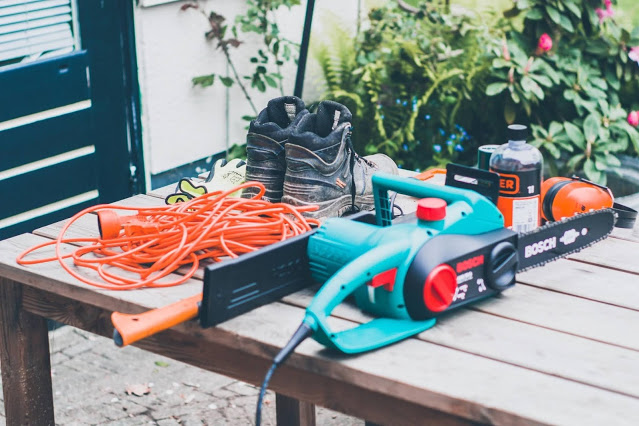We are all aware that our lives
revolve around several electrical appliances from beginning our day to ending
it. Whether it’s the phone and laptop chargers that help recharge our’ most
essential devices’, or a chain saw that serves its purpose occasionally, we
rely on those appliances regularly.
With such technological
advancements and an increase in the number of electrical appliances that we
own, it’s hard to find power outlets within reach, to power them all. Extension
cords are the instant solution in such a situation. You can use them to
power anything from a simple hairdryer to a home office.
However, be careful while
choosing the right extension cord to avoid any fire and electrical shock
hazards at home or office. It can seem overwhelming to pick the right one, as
extension cords come in a diverse variety, suitable for various electrical
appliances, though all of them serve the same purpose.
If you’re wondering how to choose
the apt extension cord for your home or office, then go through the tips mentioned
further, so you can have a clear understanding of extension cords.
 |
| 5 Tips On Choosing The Right Extension Cord |
1. Cords That
Are Thicker Carry More Power
The first and foremost thing you
need to understand is the length and thickness of the extension cords before
picking one. Usually, the gauge is the measure to denote the thickness of an
extension cord in the U.S.You must have noticed 14 gauge or 10 gauge written on
the box of an extension cord during a visit to a hardware store earlier. It’s
essential to understand, what that means though.
A rule of thumb, when it comes to
the thickness of extension cords is that thicker cords carry more power fit for
heavy electrical appliances and thinner cords carry less power. So based on
your requirement, choose the thickness of the extension cord. Any extension
cord will be able to power primary electrical appliances such as phone, laptop
chargers, and headlamps. However, to power heavy electrical appliances such as
drills and saw, choose an extension cord that has more power.
2. Pick Cords
That Can Handle At Least 15 Amps Of Power
It could be tricky to understand
the relation between the length and thickness while choosing an extension
cord.If you seem to face such a confusion yourself, then it’s better to rely on
the amperage rating while choosing an extension cord.The standard amperage
rating for residential voltage in the U.S is 125 or 130 V.So, look for an
extension cord with an amperage rating of 15 A (125 V) for household electrical
appliances.
In case you require an extension
cord for both indoor and outdoor electrical appliances, then it’s better to
evade choosing cords with 10 A or 13 A.Also, if you stumble upon an extension
cord that does not mention the amperage rating, it’s better to avoid purchasing
it entirely as that can jeopardise your safety.
3. Pick Longer
Cords Than Required
Another aspect to consider while
choosing an extension cord is its length. Always go for an extension cord that
is longer than needed. It not only allows room for any error by providing
additional length but is also safe and secure. For instance, you might connect
smaller wires to reach the desired power outlet. That might seem convenient but
is not a safe practice at all. When extension cords connected together, it
causes a resistance between the power outlet and the appliance plugged in.
Additional resistance further
drops the voltage, causing any heavy appliances such as drills and vacuums to
run at a relatively lower power. That’s not all if the resistance between the
power outlet and the electrical appliance keeps building up, then it might also
result in a fire or melt one of the extension cords. So, it’s better to always
go for longer extension cords than needed.
4. Cords Designed
For Cold Weathers Are More Flexible
When it comes to extension cords,
flexibility plays a vital role, followed by safety. You would want an extension
cord that can stretch across in a hallway or workplace.It’s more accessible to
coil and store, flexible extension cords as well. However, the challenge is to
find out which cords are flexible, as it’s not possible to guess that, merely
by looking at the box.The best way to find out whether an extension cord is
flexible is by knowing whether it’s made to sustain lower temperatures or not.
Extension cords meant for cold
temperatures tend to be more flexible than the others. However, not all
extension cords will list the exact ideal temperature ranges on the
packaging.If you can find an extension cord that can sustain below the freezing
temperature, then you can rest assured that it is flexible.
5. Choose
The Correct Indoor And Outdoor Extension Cords
The most common mistake many
homeowners make is using an extension cord with a few extra outlets to power
both, indoor and outdoor electrical appliances.No matter how convenient, that
might look, is not a safe practice as it causes an overload.Similarly, it’s
crucial to analyse the environment for the extension cords.For instance, if you
are looking for an extension cord to power lights for an outdoor event, then
buying an extension cord, made to sustain an indoor environment might not be
the right thing.
Go for a light extension cord if
you plan on using it rarely without regular usage. On the contrary, opting for
a medium-duty cord for non-stop usage would be the right choice.To power heavy
electrical appliances such as a chainsaw, use a heavy-duty extension cord.
In any given situation, try not
to overload the extension cord, as doing so might put your safety at risk.It’s
better to analyse your requirements about the extension cord, before purchasing
one. Choose the perfect extension cord for your home or office using the tips
mentioned above.
